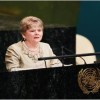“Spiritual Dimension of Food Security” is a complex theme.
When one is unwillingly hungry or malnourished, there is not much room for spirituality: the body hurts, the mind is obsessed by the lack of food, the soul has little or no room to thrive. Body and soul are one, and only heroes or extraordinary characters can develop a beautiful spiritual life when lacking adequate food. This happens, although it remains an exception. Hunger is a burden imposed on the poorest of the poor that defeats the purpose of spiritual enhancement.
We used to talk in the Food and Agriculture Organization of the United Nations (FAO) about four dimensions of food security: availability, access, use and stability (of the three previous dimensions). Each has in itself a spiritual dimension. Food must be available, in sufficient quality and quantity for all in the area where one lives. Food production and marketing should be practiced in a spiritual manner; farmers and traders have a responsibility in this. Food must be accessible; that is affordable at a reasonable price, particularly for those who need it most, the poorest. Food prices need to be regulated – believing that ‘markets could work for the poor’ is, in my view, irresponsible and anti-spiritual. And the food must be nutritious, or of a quality that warrants proper use by the organism. We know how much good food grown and cooked with attention and love can do for both the body and sour. Sharing a meal is a sacred act. Food is, sacred; we are what we eat. Our bodies are sacred; we should not be obliged to eat ‘junk food’. Food should not be seen as just a commodity traded on markets, ignoring its spiritual quality and content.
If these four dimensions or preconditions were met, everyone would have the opportunity to live a healthy, and active life, could interact happily with other living beings around, and reach a sense of belonging, recognition, accomplishment.
The spiritual dimension of food security derives in my view from the commitment of those who are healthy and food secure to help the hungry in becoming food secure, and more generally to change the course of strongly unequal social organizations, political systems and ill-conceived policies that tolerate abject forms of poverty. This entails the application of spiritual values and forms of action aimed at changing the state of things. FAO, under its food security agenda, is promoting social protection systems, decent employment in particular for women and youth, family food grants, emergency food supplies, sustainable, small scale and gender-sensitive bio-intensive food production and marketing, participatory rural development, access to land for the poor, for women, आदि. All these actions can be sound, and this is what FAO tries to promote and enact through programs and projects. But all this could only remain good ideas, if actions are not animated and inspired by compassion, सहानुभूति, enthusiasm, and many other values that make societies responsible and accountable for their weakest members.
(Dominique Bordet, Senior Officer in the Technical Cooperation Department, FAO (Retired). He continues to conduct yoga classes at FAO.)






The article was very interesting to read, I have a different view on food now,to use the most important ingredient which is love.and how food should accessible and affordable for all,
Dear Br Dominique, and editorial team
ओम शांति
Please forgive if stating the obvious. For 15 years have worked on the area of micro nutrient dense food because the condition of the soil, food processing methods and length of time to market mean that most food no longer offers the consumer sufficient micro nutrients. Obesity and diabetes have reached epidemic proportions in many parts of the world even where the consumers can afford to buy varied foods. The leading manufacturers have mass marketed “sugar, salt, oil, combos” known by the misnomer of “bliss factor”. The terms “food safety and food security” do not encompass this aspect of nutrient security. The lack of nutrient security has been termed “hidden hunger”. (person eats, food does not nutrify, body still feels hungry, calls for more, sterile food eaten -cycle) All national Health budgets are affected.
How would it be if we used the magnet of nutrient repleteness in developing our food? If populations become nutrient replete, could we evolve? The form of a nutrient and how it is absorbed are the two key technical factors in additional to the attitude issues raised. This as yet has not gained traction with major food producers.
We have not accessed public and private funds for research yet but if you do, could you begin the encouragement of research on the nutrient content of vegetables. We know that organics give the consumer protection from pesticide residues and more conscious attitudes to growing. But we still do not know the nutrient content of the food.
Imagine if the farmer were paid at the market for the nutrient content of the produce?
There are people talking of a Nutrient economy and it could galvanise world development in lots of ways. Instead of war to pull economies out of recessions, a new focus on nutrient content to create people who could be assessed to be nutrient replete, with all the resultant economic activity is being thought of as one such opportunity.
“Food safety” is a process of checking that food manufactured and processed is safe for the consumer. I can get a food safety certificate by making fried oil, sugary products, if the factory is clean and has a process for documenting and checking that all facets of the production process are in line with Food Authority regulations and labelling laws. That this might add to the National health budget in health consequences experienced by the consumer are not at issue for the”Food Safety Certification process”. Dadi’s message is clear and beautiful, could the title be expanded?
With all our best wishes the other issue is that pregnant mothers need not just folic acid and an iron tablet in a form that may tax the liver. It would be great if mothers could be fed from conception with nutrients in a form that the body could use. That would mean that healthier babies would be born and during feeding the babies could derive more benefit if the mother is fed a bio-available nutrient dense diet. In our small sample, mothers cope better, babies sleep better with anecdotal well being all round. This could change the poverty and domestic cycles substantially. Karma aside, Brain development from conception to 2 years is a key time. This also has consequences for all national health, social development and education budgets. Again researching this beyond the current notions that exist in the world food organisations and markets could be useful and informative.
Thank you for the articles and the encouragement to re-consider food
Best wishes
Rose